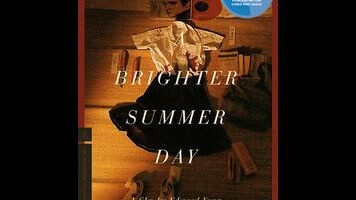Long considered a crowning jewel of the New Taiwanese Cinema—a movement that also gave the world Hou Hsiao-hsien and Tsai Ming-liang—A Brighter Summer Day straddles several genres: It’s a teen-rebellion movie in the tradition of Rebel Without A Cause, an Eastern cousin to Martin Scorsese’s early gangster saga Mean Streets, and a family drama with shades of director Yasujirō Ozu, especially in its use of doorways as frames and long takes as tools of empathy. The film’s Taiwanese title, which translates literally to The Murder Incident Of The Boy On Guling Street, makes explicit the true-crime roots of the story. But while Yang builds inexorably to the infamous event, there’s never a sense that the movie’s punctuation is its raison d’être. The writer-director is after something larger, a vision of adolescence as a battle for identity.
In an enormous cast of speaking roles, our hero is a 14-year-old boy who doesn’t speak often. Like a lot of kids his age, Si’r (Chang Chen, a future Asian movie star making his screen debut) is self-conscious and often withdrawn. The youngest son of his family, which fled from the mainland to Taipei after the Communist victory in 1949, Si’r struggles academically—he’s been demoted to the less-prestigious night school—and is caught between two warring street gangs, one made up of fellow mainland transplants and the other populated with sons of the locals. Though occasionally bullied by members of each side, Si’r pledges allegiance to neither, staying out of the conflict that consumes his classmates. That is, until he falls, almost accidentally, into a kind of quasi-romance with Ming (Lisa Yang), who’s dating the aforementioned Honey (Lin Hung-ming), absent leader of the Little Park Gang. Before long, this innocent courtship has led him down a path away from his studies and into violence.
We’ve seen countless versions of this story before, the good kid corrupted by the magnetic pull of a dangerous influence. But this is where A Brighter Summer Day’s extended running time pays off: Si’r’s spiral towards tragedy never stretches credibility, because Yang takes the time to let it realistically occur, showing us each factor that contributes to his slow transformation. Those extra minutes also help the film sidestep the pitfalls of five-alarm cautionary tales (whatever the Taiwanese equivalent of an after-school special might be), mainly by affording Yang the breathing room necessary to develop a remarkably rich and nuanced supporting cast of characters. Everyone on screen gets their due, from Si’r’s struggling parents (Chang Kuo-chu and Elaine Jin) to his pitiable gambling-addict older brother (Han Chang) to the various high and low members of each gang. Yang finds time for multiple subplots, including that of a pint-sized crooner who specializes in phonetic Elvis renditions (the American title is a line from “Are You Lonesome Tonight?”), without ever hijacking the trajectory of his central narrative.
A Brighter Summer Day never drags, in no small part because it makes this very particular time and place—the stomping grounds of Yang’s own childhood—feel so vivid: From the pool-hall headquarters of the 217 gang to the soda-club hangout of their rivals to a local makeshift movie studio, every backdrop seems translated from the director’s memories. (Never is the air of autobiography less faint then when Si’r is squatting in the rafters of the movie set, spying on the bickering actors below and hinting at the, well, brighter future that his creator grew into.) This is one of those movies that embeds you so successfully in its world that the prospect of leaving it can inspire premature pangs of melancholy. It helps that every shot is a stunner, Yang always finding the perfect distance from which to film his conversations and confrontations, and capturing the soft, romantic haze of summer nights—the teenage hours, if such a thing exists—about as well as any filmmaker not shooting on digital ever has.
In an essay included in the superlative Criterion release, critic Godfrey Cheshire writes that, “For non-Taiwanese viewers, the world Yang conjures can have the paradoxical effect of seeming foreign yet also oddly familiar.” He’s not just getting at the way that the film’s recreated Taipei, with its influx of Western culture, seems to filter the touchstones of ’60s youth—diners, early rock ’n’ roll, etc.—through a different lens, resulting in a kind of alternate-universe version of our own shared iconic past. Cheshire is also hinting at Yang’s ability to bridge what’s highly specific about his material (namely, the identity crisis of those uprooted and relocated by the war) and what’s not so specific about it (namely, being 14 and confused and impressionable). That’s what makes the film’s delayed arrival in the States, after years of acclaim from those lucky enough to see it, so baffling: Even setting aside the successful release of Yang’s later masterpiece Yi Yi, which should have opened the floodgates on his filmography, there’s no reason for this heartbreaking, relatable epic taking so long to make it Stateside. The language of mixed-up youth is universal.










![Rob Reiner's son booked for murder amid homicide investigation [Updated]](https://img.pastemagazine.com/wp-content/avuploads/2025/12/15131025/MixCollage-15-Dec-2025-01-10-PM-9121.jpg)

























![HBO teases new Euphoria, Larry David, and much more in 2026 sizzle reel [Updated]](https://img.pastemagazine.com/wp-content/avuploads/2025/12/12100344/MixCollage-12-Dec-2025-09-56-AM-9137.jpg)




